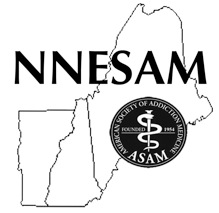I am loving these beautiful days and hope that you are too. There is NO better place to be in the summer than in Northern New England…take your pick of our three awesome states!
Since I last posted I have been asked to post a couple of references from NIDA and I am happy to do so. Some good info regarding fentanyl in our communities.
https://nida.nih.gov/videos/reducing-risks-fentanyl-in-us
https://nida.nih.gov/research-topics/trends-statistics/infographics/what-fentanyl
As the Medical Director of a Professionals Health Program, I also am adding an editorial I wrote recently in response to a shaming newspaper article in NH about a healthcare professional who has a substance use disorder. That is below my blurb here.
On October 1, I will be traveling to DC with Dr. Fred Lord (pres-elect) to connect with other chapter leaders from around the nation. We have been working to offer more opportunities for interaction as a chapter. We now have a membership committee and would like to invite anyone interested in becoming involved to contact me at molly.e.rossignol@gmail.com. Goals will be to determine what is most important to the membership and how to engage members.
Planning is underway for a spring Annual Meeting in person in Maine. Please save the date: April 29, 2023.
Remember that members are invited to attend our monthly meetings. Be on the lookout for an invitation!
Happy mid-August!
Molly
Here is my editorial:
Newspaper articles noting addiction in our healthcare professionals (HCP) should serve to highlight the awareness of the risk of this condition in our caregivers and the nature of the work in a healthcare setting. They should not be a source of shame nor stigma any more than a substance use disorder should push anyone into the shadows for fear of asking for help. Healthcare professionals suffer addictive diseases as often as the general population and some studies suggest more. One of the symptoms of a substance use disorder is diversion. Diversion is defined as use of a medication that is not prescribed for an individual. “This is a symptom?” one might ask. Yes, brain illnesses like addiction or depression display symptoms that show up in behaviors: Isolating oneself, displaying irritability, appearing disheveled or not caring for oneself. Or stealing the drugs for personal use. While clearly not legal, the behavior is in response to the brain illness that says, “Despite the consequence…this drug will help me today” This is not unlike alcohol use disorder where individuals continue to use alcohol (a legal and yet highly lethal substance) despite consequences that may include physical and mental health decline, negative family and social issues and legal ramifications.
Since 2014, I have seen the evolution of screening of patients, development of treatment options, harm reduction strategy legislation and implementation and the espousing of stigma reduction for people who use drugs. It is more important than ever to take a supportive stance in caring for our healthcare professionals who are affected by substance use disorders. The New Hampshire Professionals Health Program (NHPHP) is such a service, contracted by the state, that can offer resources to our licensed professionals who need evaluation and treatment for substance use disorders in addition to other potentially impairing conditions. The program monitors the progress of the individual and helps get them back to work caring for patients. We owe it to our healthcare professionals who have worked hard to provide care for our communities, to provide understanding and compassion as they too, get sick and need help.
Molly Rossignol, Hopkinton
Medical Director NHPHP
603-491-5036
